
Dense acrid smoke is still rising from a school destroyed by a missile strike when mortar rounds come in, spraying shards of jagged steel and scattering a crowd that has gathered to receive aid in the town square.
A moment of stillness follows, with just the rustling of a light autumn breeze, before those who have thrown themselves to the ground begin slowly to get up, shaking dust off their clothes, and to look around for others.
Children cry, families and friends anxiously call out to each other. There are some injuries, but none of them are severe – quite surprising considering the force of the blasts. “God protected us all today,” says one woman, crossing herself before gathering her two small daughters into her arms.
The late-morning attack is a predictable and violent routine in this town on a section of the front line near Avdiivka. Daily runs by the emergency services take the wounded – and at times, the dead – to the hospital in nearby Kurachove, and further afield to Dnipro.
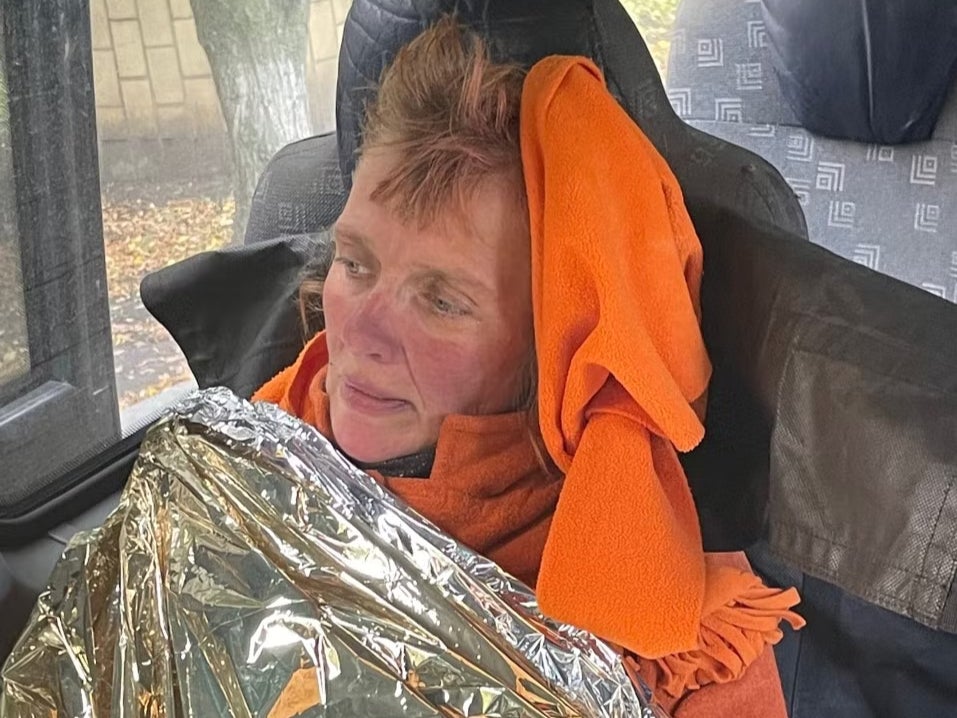
Forty minutes later comes a blast in another part of town. We go there, with two members of the “White Angels” police team, to find a large, deep crater in the road. There are no casualties, but a crowd says a local woman has not been seen since another bout of shelling two days earlier.
During a search of the houses, we find Natalya lying face-down in her kitchen. She looks still, and the initial fear is that she has died. But then there is a slight tremor: she has survived, wounded and shivering from hypothermia though she is.
Natalya is silent at first, staring around in panic. Then she begins to whisper between sobs: “No one came until now. I am hurting. It has been so cold, so cold ... I am afraid. I don’t want to die here, lying like this by myself.”
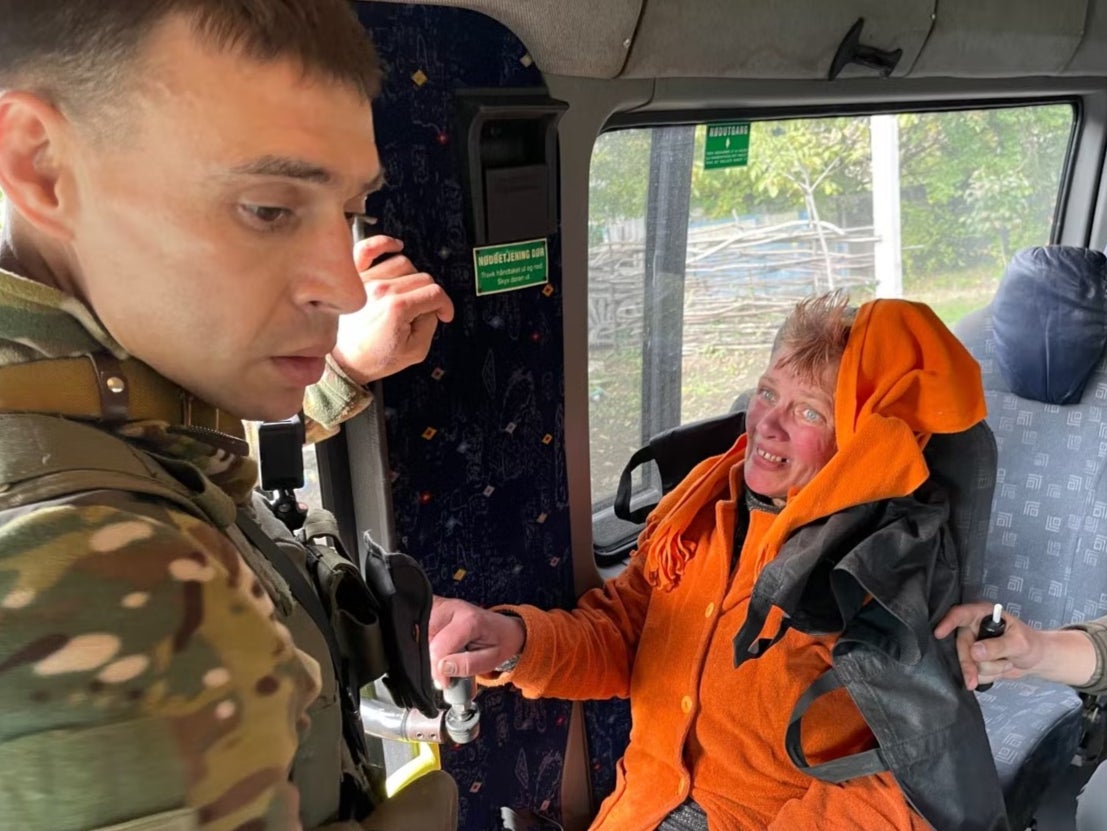
Major Vasilyi Pipa and Captain Yevgeny Afendikov administer first aid and place Natalya in an insulating wrap. “It’s a great relief that she is still alive, but it’s really surprising after two days,” says Major Pipa. “She needs to be taken back quickly for treatment now; the doctors will do what they can. But they are going to keep getting hit here. It’s just too close to the border.”
As they face major reverses elsewhere, Russian forces are attempting to capture Avdiivka and Bakhmut. Both cities are enduring ceaseless missile and artillery assaults, and towns and villages around them are getting caught in the crossfire.
On the way to Krasnohorivka, it is possible to see separatist-held Donetsk city; some stretches of road are just 300 metres from Russian positions. “Small arms fire range,” explains Capt Afendikov after some gunshots come our way. “But don’t worry, this is a very short bit, we will drive fast, we do this all the time.”
The White Angels are a police unit who, on top of their regular duties, engage in combat against Russian and separatist forces, and even carry out firefighting, ambulance and bomb disposal duties.
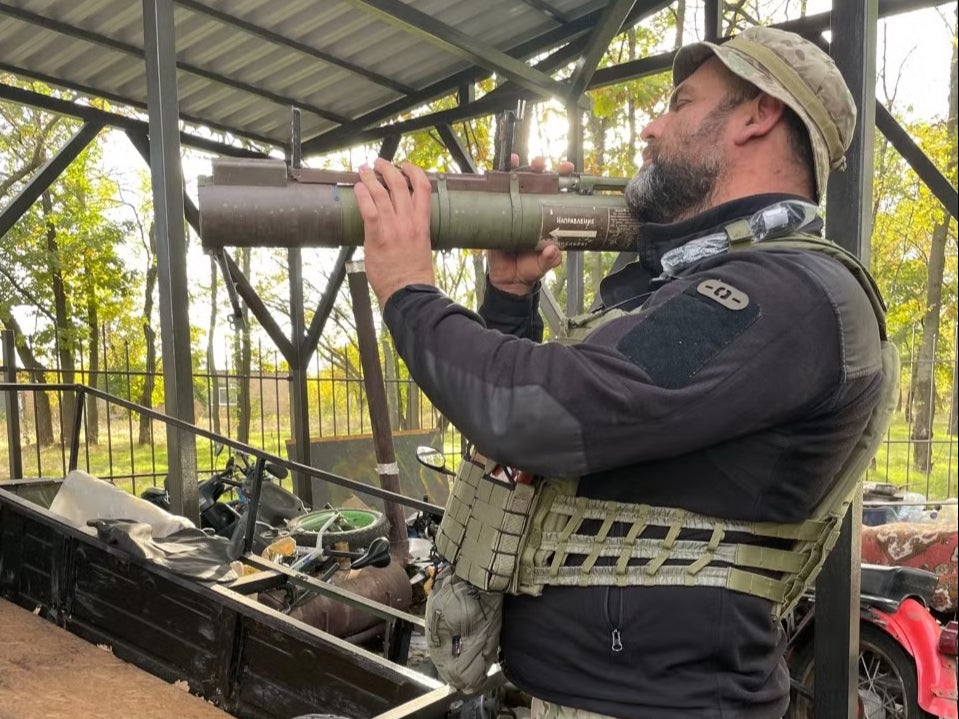
Their name was given to them by local people because of the colour of the vehicles they drive and their impressive record of saving those who are injured and trapped following attacks.
“It’s too dangerous for the ambulance and fire crews to go to these places, so we have had to extend what we do,” says Major Pipa. “We have had to do things we never thought we’d be doing, like dealing with like bombs which haven’t gone off.
“We have had some difficult situations, under fire and colleagues injured. We have got a few armoured vehicles, but we can do with more – the rest are just ordinary vans.”
The pair are called to a ground-floor apartment where there is, indeed, unexploded ordnance. A 3ft-long shell, which looks like a howitzer round, has come through the back wall. The officers move it, with the help of the homeowner, to a ditch further on at the side of the road, laying it neatly next to three others.
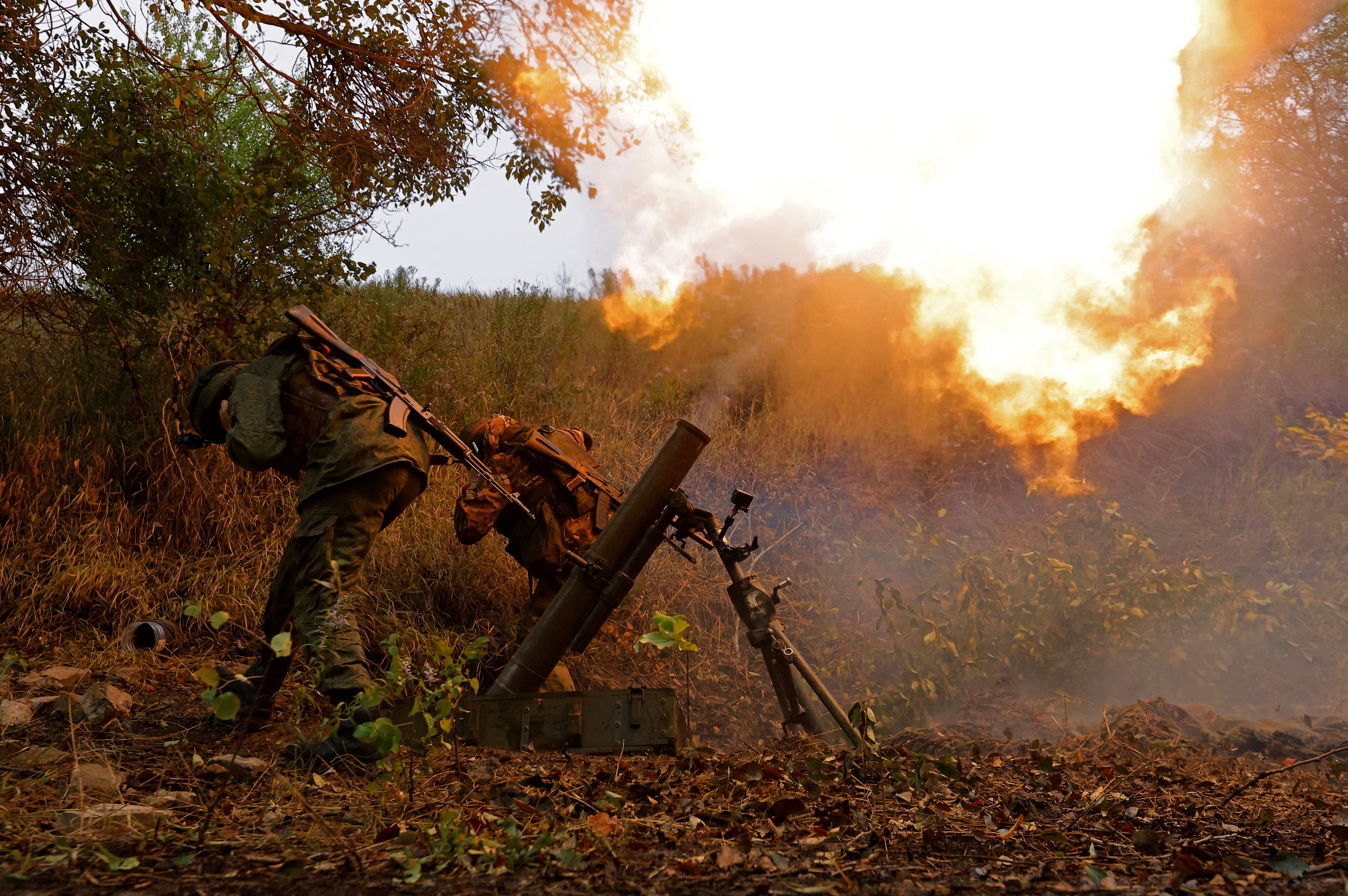
“It’s a question of being very careful,” says Major Pipa. “They will be collected and disposed of by the special squad. They are too busy to come and collect from each location, this is such a busy area for fighting.”
Krasnohorivka was briefly captured by separatists in the 2014 conflict that led to the creation of the so-called People’s Republics of Donetsk and Luhansk. It was retaken by Ukrainian forces later that year, but is now once again a place of strife.
Dmitryi Nelypa, the surgeon in charge of the trauma unit at Kurachove Hospital, recalls the conflict eight years ago. “This time it is far worse,” he says. “We are seeing so many cases with damage caused by shelling and aviation rockets. Some of these attacks might be mistakes, but there are too many of them not to think they are deliberate.
“We have got enough medical supplies with international and domestic help at the moment. But we also have to think of the future. The rate at which our forces are advancing means they may well liberate Donetsk. I don’t know the state of healthcare there now, but that is a possible emergency we have to bear in mind.”

Most of Krasnohorivka’s pre-war population of 16,000 have left. But a few thousand are determined to hang on, despite the dangers.
Alexandra Chernikova is among those who stayed behind despite pleas from her son to join him in Dnipro. The barrage of missiles that brought down the school left her with leg injuries.
“I had gone into the garden when the rockets came,” she recounts. “One landed very close to me, it seemed to be just five or six metres away. There was a very loud noise, a flash of light, and then there was a big gash in my thigh. There was a lot of blood.”
Alexandra, 43, wants to go back home after receiving treatment at the hospital. “I have lots of animals to look after,” she says. “Not just my own, but those of my neighbours who have left. I can’t abandon them. I moved here from Donetsk in the last war. We can’t just keep moving all our life. I am sure our forces will push back the Russians and we will get fewer aviation bombs in the future.”
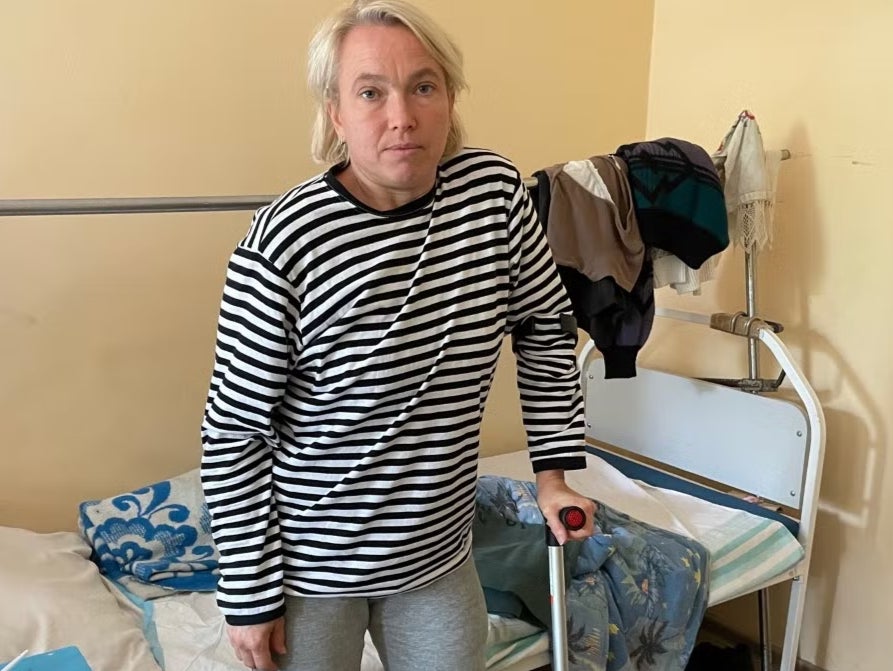
Valentina Romanenka is being taken back to Krasnohorivka by the White Angels after hospital treatment following a missile strike. She and her husband are also from Donetsk, and their two daughters continue to live in the separatist region.
“We are both getting bombed, them in Donetsk and us here,” she says. “This is a terrible war. It has been going on for month after month. We hope it will end soon, but we are not optimistic... how can we be?”
Valentina, 62, spent two weeks with her daughters in Donetsk when the borders were still open last autumn. She doesn’t know when they will see each other again. “One of the few pleasures of getting old is seeing your grandchildren grow up,” she laments. “We can’t do that. It is so cruel.”
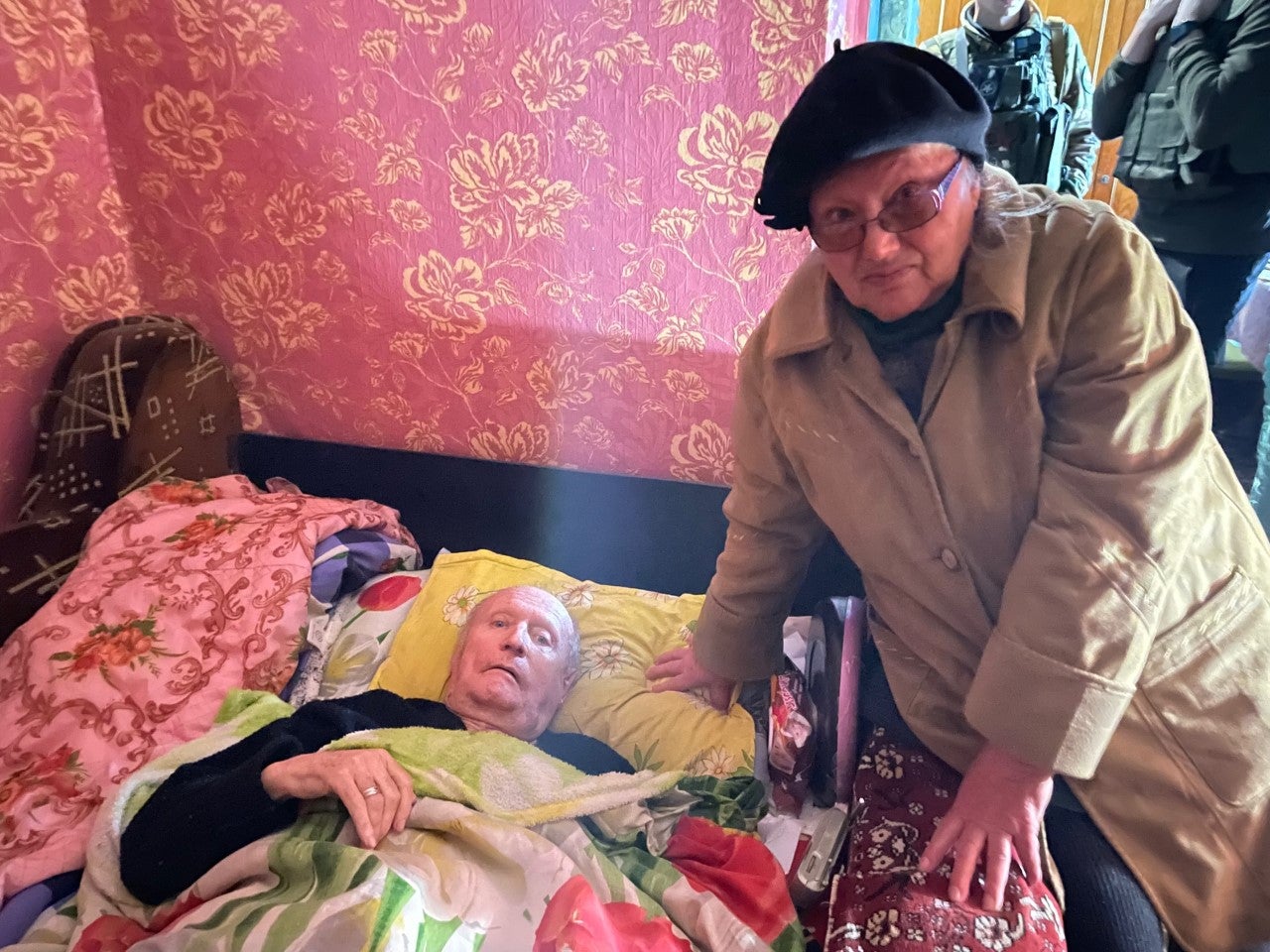
Valentina and her husband, Viktor, also want to stay in Krasnohorivka. On Sunday, 24 hours after she returned from hospital, there was further shelling, and Viktor had to be evacuated with injuries to his shoulder and arm.
Maya Chickonenko, 75, and her husband Anatoly, 81, are deciding whether to stay on. Anatoly needs constant medical care after a stroke. Major Pipa tries to convince him that he needs to be in a city, such as Dnipro, but Anatoly is loath to leave his home.
“We have been married for 49 years and we hoped we would be here for our 50th anniversary and the rest of what’s left of our lives,” says Maya. “But it looks like that may not be possible. I will try to persuade Anatoly that we have to leave for a while and then come back.”
Two explosions are heard not far away. “More bombing, that will help make up his mind perhaps,” muses Maya. “But I am not sure what we will find still left if we ever get back.”







